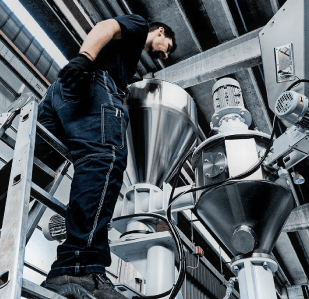Oxidation is a natural chemical process that can significantly affect thermoplastic materials during the extrusion process. It occurs when the material reacts with the oxygen present in the environment, causing a gradual degradation of its chemical, physical, and mechanical properties. This phenomenon is often exacerbated by high temperatures and suboptimal operating conditions.
Causes of Oxidation
- High temperatures: During extrusion, inadequate heat control can accelerate the interaction between the material and oxygen, leading to premature degradation.
- Prolonged exposure to air: Excessive exposure to oxygen during processing increases the risk of oxidation.
- Presence of impurities: Poorly mixed additives or contamination can act as catalysts for the oxidation process.
Effects of Oxidation
- Loss of mechanical properties: Oxidized materials become brittle and less resistant to impacts or stress.
- Aesthetic changes: The phenomenon can cause color changes, spots, or opacity on the product surface.
- Reduced durability: Oxidation compromises the material's chemical stability, reducing its longevity in aggressive environments.
Strategies to Prevent Oxidation
- Use of stabilizers: Specific additives, such as antioxidants, protect the material during exposure to high temperatures.
- Temperature control: Careful regulation of heat in the extrusion zones prevents material overheating.
- Reducing exposure to air: Designs that minimize contact with oxygen, such as closed chambers or controlled atmospheres, can limit the phenomenon.
How Bausano Works to Combat Oxidation
Bausano designs extruders with advanced technologies that ensure precise temperature control. Our lines are customized according to customer needs and the material being processed, ensuring optimal processing and preventing oxidation risks. Through innovation and customization of our solutions, we support customers in producing high-quality, long-lasting materials.



